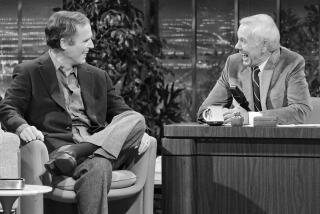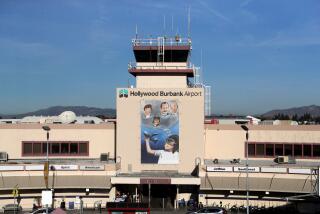No End to This Terminal Battle
- Share via
BURBANK — With a six-month truce about to expire, feuding officials remain as far apart as ever over a proposed larger passenger terminal at Burbank Airport.
On Wednesday Burbank sued its airport partners, the cities of Glendale and Pasadena, seeking an order blocking the purchase of land for expansion.
“The bottom line is, we’re not going to sit around and watch them build a terminal that’s three times the size of this one without having a fair say in the matter,” said Burbank City Council member Bob Kramer Wednesday. “They’ve been jerking us around for years and we’re not going to take it any more.”
A day before, the authority that runs the airport, made up of representatives of all three cities, sought a court order that would bar Burbank from opposing a larger terminal.
The cities share management of the airport but Burbank, the host city, has waged a bitter fight against expansion out of fear of the congestion and noise it would bring. Last December, the three cities agreed to a moratorium on new litigation, and to hire mediators to try to work out their differences.
But rather than cool tempers and pave the way for a compromise on improving the crowded airport that serves 5 million passengers annually, the “cooling off” period has brought only more bickering and threats, and virtually no productive movement.
*
To many, the collapse of the truce was inevitable. The only question for weeks has been when.
“It’s all bad from our point of view. We’re faced with the same situation we were six months ago,” Ted McConkey, a Burbank councilman, said recently. “It’s a Burbank-Chernobyl and the fallout is going to extend far beyond city limits.”
The failure of mediation left unresolved Burbank’s concerns about noise, traffic and influence over an expanded airport located in the city.
The impasse also temporarily blocked Glendale and Pasadena representatives, who are eager to replace the old terminal with a modern terminal farther from existing runways. They say they simply want to ensure the future viability of the airport.
Many in Burbank fear that the authority’s expected purchase of about 140 acres from Lockheed Martin Corp. for terminal expansion is virtually a done deal. Only the truce has kept officials from signing on the dotted line, they say.
In fact, airport and authority officials acknowledge that staff has been working toward an agreement with Lockheed, and hopes to finalize a deal as soon as possible. Estimates of the land’s cost are around $110 million, with the terminal building--which would be at least several years away--likely to cost an additional $235 million or so, officials said.
Despite objecting vigorously, the Burbank contingent on the nine-member authority board that runs the airport felt powerless to stop the land purchase. Each city has three representatives on the board, but the Glendale and Pasadena members regularly vote as a bloc against the Burbank group.
Some local officials and residents worry that airport plans for the new terminal would result in more planes making noise above Burbank and much more traffic on city roads.
Lawyers for the city of Los Angeles, representing residents near the airport, have already sued in an effort to block construction of a new 465,000-square-foot terminal three times the size of the existing one.
Airport officials counter that the terminal is needed to meet the growing demands of air travelers in the area. Also, noise, based on figures reported to federal authorities, has declined in recent years primarily because of quieter planes, they said.
The Federal Aviation Administration long ago recommended moving the terminal farther away from the runways for safety reasons.
The rancorous nature of the debate regularly shows in public.
At the latest airport authority meeting earlier this month, a visibly agitated Carl Raggio Jr. of Glendale, the group’s president, banged his gavel and adjourned the meeting as authority member Margie Gee of Burbank repeatedly tried to make a point.
“Mrs. Gee, we’re going to go to closed session and we’re going to go now,” Raggio said firmly.
While Burbank representatives complain about what they consider Raggio’s heavy-handedness, Raggio counters that too much time is spent on minutiae.
For instance, the authority and its subcommittees have thoroughly reviewed issues such as the airport’s recently approved $42-million budget for fiscal 1996-97, and there is no reason for authority members to continue to question the budget time and again, Raggio said.
Raggio was among those who said his main goal was to move the airport terminal forward so that the facility meets the future needs of passengers, airlines and surrounding communities.
Raggio said he does not attempt to bully authority members who disagree with him, as some critics contend.
“I’ve tried to get some things done,” he said. “Everything we’ve talked about is what is and what was. These people don’t talk about future tense.”
The animosity is not limited to expansion. The authority has challenged a new parking tax imposed by Burbank that calls for a 10% tax at profit-making parking facilities. The city ordinance, effective Feb. 1, would cost the airport about $1.2 million of its estimated $12 million in parking revenue a year.
Burbank commissioners Gee and Philip Berlin complained that they are not treated with respect, and have no choice but to be insistent and sometimes abrasive to make their points.
“As much as I may irritate Mr. Raggio, that’s the way one functions in a democratic board,” Gee said. “Burbank is very concerned.”
Berlin said the Glendale and Pasadena bloc is too influential.
“Right now there really isn’t an equality in the process,” he said. “That creates a more strident atmosphere out there.
“I think we’re all frustrated,” he said.
Some Burbank officials also remain suspicious of how the land deal and the terminal expansion project will be funded.
Thomas E. Greer, executive director at the airport, said the overall project will rely on a variety of financial sources, such as increased fees for airlines, concessions, rental properties, parking, loans, federal grants and the airport’s uncommitted cash reserves of about $30 million.
The Airport Authority’s rules regarding the acquisition of debt require what is called a “super-majority” from each city, meaning two of each city’s airport commissioners must agree to take the authority into debt.
“We don’t know yet which way we’re going to go,” Greer said. “I won’t build anything bigger than the airlines want.”
Airport officials said their main goal is to do a good job of running an airport that is playing an increasingly vital role in the lives of residents throughout the San Fernando Valley, Los Angeles and surrounding areas.
*
But Gerald W. Cormick, one of the two mediators hired in March, said that despite the many hurdles, his goal remained to broker a working agreement by Wednesday. Cormick said he and fellow mediator John Jostes have tried to encourage a middle ground on various issues for both sides.
“It’s very hard to solve part of the problem and feel like you’ve accomplished anything,” he said.
Cormick said the deadline could bring several results. Among them: A deal could be struck in which the two sides agree to plot forward movement, an extension to the mediation could be declared or the talks could be cut off completely.
“I don’t think everybody’s dug in so deep that they can’t find a way out,” he said before Burbank’ latest legal action was announced. “These are very difficult and complex problems that involve a lot of people. It’s not hard to understand where people are coming from.”
More to Read
Sign up for Essential California
The most important California stories and recommendations in your inbox every morning.
You may occasionally receive promotional content from the Los Angeles Times.













